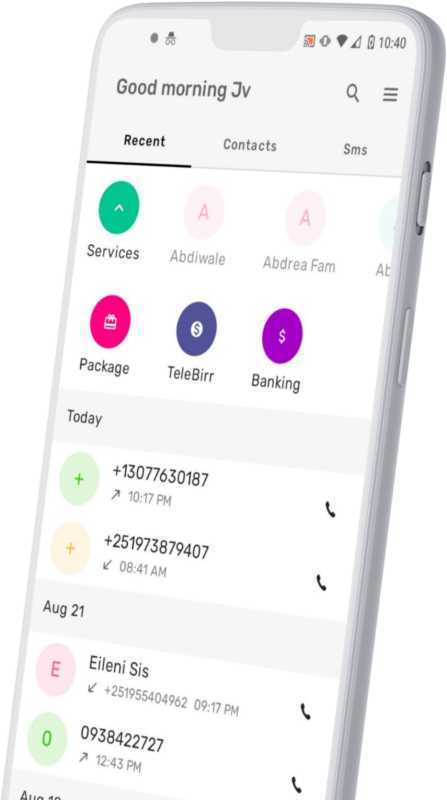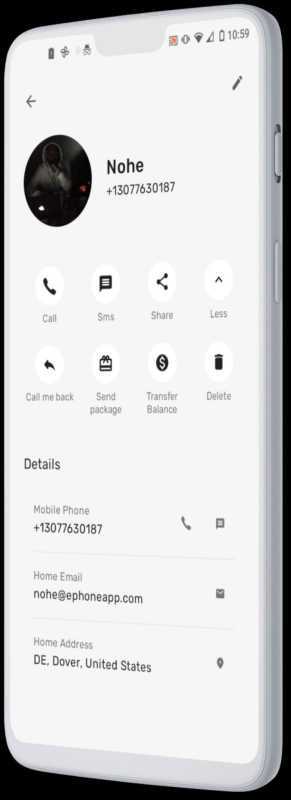EPhone - Ethiopian super dialer app

Imagine having a dialer app where you can do more than just dial. This is where EPhone comes in. EPhone is a mobile dialer and SMS application that was launched in 2019.
Imagine having a dialer app where you can do more than just dial. This is where EPhone comes in. EPhone is a mobile dialer and SMS application that was launched in 2019. In our brief interview with the CEO, Nohe Fekade, he tells us about the overall journey of the startup: where it started, where it is now, and where it plans to go.
It all started when Nohe Fekede was looking for freelance developers while working on his other startup. He then met a developer named Haileyesus Shitalem. After their first contact, the pair worked on different projects. EPhone, at that time, was launched as an application on play store. Haileyesus had the idea, and although he built the app, he wasn’t taking it very seriously. Nohe says that he was amazed when he found out about the project. The two then discussed the project, and that’s how EPhone began as a startup in December 2019 with Haileyesus as the CTO. EPhone currently has more than 180 thousand downloads, of which 42% are monthly active users
The concept behind EPhone is a simple but effective one. In Ethiopian telecom services, high demand for automated USSD procedures exists. People would like to use ready-made USSD commands rather than inserting the codes themselves. Nohe says that he himself needed that type of service and used it to save ready-made USSD codes saved as contacts so he could dial them directly and get the service. Even though there were other applications that offer such services, Nohe says that they are separate from the dialer app. This is what makes EPhone unique. The application delivers a dialer app that comes with built-in automatic USSD features alongside many exciting utilities.

The mission of EPhone is “building a modern-day Phone app.” Dialer & SMS apps are known to facilitate telecommunication services like dialing and SMS. Nowadays, however, telecommunication services are much more diversified and a modern-day dialer like the EPhone app seeks to be an application that can manage the current and future diversifications of telecom services.
Ethiopia has recently started to host foreign telecommunication companies. Nohe says that this move affects their company in two ways. The first one is when private telecom companies start operating in Ethiopia, they will offer more telecommunication services. People would make more phone calls; would need to know more USSD codes; etc… This provides EPhone with a great opportunity. With their product-customer fit principle, EPhone finishes its preparation to support multiple telecom operators. Nohe says that they have successfully tested their application with Kenya’s version of Safaricom and are ready to do the same in Ethiopia. The second one is a risk rather than an advantage. The new telecom companies might want to tap into new market territories, like that of EPhone. But they are focusing on the optimistic side of things, he adds.
When it comes to marketing, EPhone, as a company, follows certain concepts and principles. These concepts are Product-Market Fit and Product-Customer Fit. The Product-Customer Fit is a concept in which a product should be ready and able to solve a problem whenever a problem arises from a customer. In EPhone’s case, Nohe gives the example that if a customer wants to buy internet packages using EPhone, then EPhone must have the features that can satiate the customer’s need all the time. The Product-Market term is rather vague. But Nohe describes it as, once the Product-Customer fit is achieved, it’s a question of how that product can be scaled upwards to reach a target user. In EPhone’s case, their target is smartphone users. In Africa alone, there are a quarter of a billion smartphone users. So the product-market fit aims to reach their target with a customer-fit product.
The main challenge EPhone faced when starting out was that it was not making any money. The founders, therefore, had to come up with “smart techniques” to get monetization from the app. One of these techniques was to develop a feature that could sell airtime. Apart from generating money, the feature made them realize that there was also a high demand for airtime. They then started looking for clients they could “tap into,” such as NGOs and embassies who had a high demand for airtime. After that, they mainly built web-based platforms that could automate airtime recharging for their clients; this made them generate money and sustain themselves while EPhone was growing. Furthermore, EPhone recently has received funding from angel investors.
Over the past two years, Nohe says that there isn’t much scaling in the size of the company. They often hire freelancers to deal with workloads. Nohe says that they do this for a reason. The company has a plan to build upon the founding team, in which members get equity ownership. This, according to Nohe, makes them cofounders rather than employees.

As the company is growing, some manual processes need to be automated. The automation process also brings its own technical challenges. Nohe says they are not aiming to reach the Ethiopian market alone but plan to extend their reach outside Ethiopia, and in those areas, EPhone mainly targets telecom operators. This means they test and validate their product for multiple markets. Achieving that without opening branch offices in different countries is the biggest challenge they face, Nohe says. In the areas they plan to reach, EPhone mainly targets telecom operators. They test different operations and technologies to figure out what works best before they actually start scaling towards the target areas. These tests aim to find a viable and dependable solution.
When asked about competition in the market, Nohe says some applications offer similar services to EPhone. Some of these companies can be considered giants in the industry. But none of them give the same services as EPhone does, Nohe says. They solely serve as a dialing app or a USSD processor, while EPhone provides a combination of those. Because of this, Nohe says, EPhone doesn’t face any direct competition.
Policy-wise, Nohe says that there should be a lot of changes in Ethiopia. Entrepreneurs always face problems one way or another, he says. One of the key principles of being an entrepreneur is finding a way through all the challenges. EPhone has managed to do that, Nohe says, but some changes could be made to make the road easier. One of those things is incorporating a company. Nohe says that renting an office and all the pre-requisites are unnecessary to start a company and could be discouraging. An entrepreneur should focus on being valuable to a market or a customer. Lack of flexibility in taxation laws is also a problem, he adds.

Being a CEO, Nohe says, is full of responsibilities. It means being both a leader and a manager. A CEO must be able to know the difference between the two. Losing the balance between the two negatively affects a company. Nohe states that a CEO has to be very intentional about their actions. Their behavior, actions, and decisions impact the employees and clients, so a CEO needs to be very careful about their actions, as they might end up helping them or doing the opposite. Having an optimistic mindset and being energetic also helps in keeping the team motivated.
In the next five years, Nohe says that he and his team plan to exit EPhone, meaning that they plan to grow and sell the company. To achieve that, EPhone is constantly improving itself. Nohe says the app, must be ten times better than the default dialer app in order to achieve customer preference. It also must have unique features that can’t be found in the default dialer app. They have come a long way in this regard, and Nohe says, very soon, they will advance the application even further to reach a larger audience and market.
